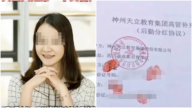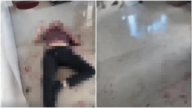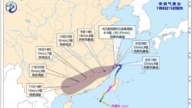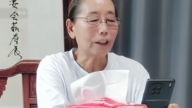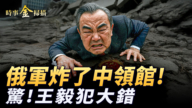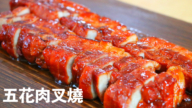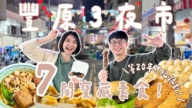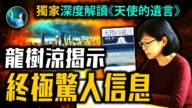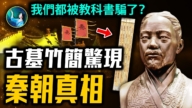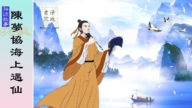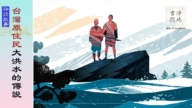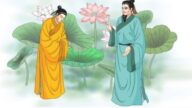【新唐人2012年7月31日讯】长期以来,人们似乎已经习惯了中国运动员在夺冠后千篇一律的“感谢国家、感谢领导”的致谢词,但在7月29号的伦敦奥运赛场上,中国选手喻丹夺取了射击项目的铜牌,在赛后她说出了“最想感谢父母”的获奖感言,不但让在场的中国记者鼓掌,也让在场的各国记者感动,更有评论认为,中国运动员已有所觉醒了。
7月29号,伦敦奥运会射击比赛在皇家炮团军营结束女子10米气步枪决赛,现年25岁、来自四川内江的喻丹以501.5环的成绩摘得铜牌,一名英国女记者向喻丹问道:“喻丹,能说说你获得铜牌后的心情吗?”
喻丹没有像被洗脑的中国运动员那样,先“感谢国家、感谢领导”,她只说了一句“我最想感谢我的父母……”,说完忽然哽咽了起来,随后她站起身,恭恭敬敬的鞠了一躬说,“爸爸妈妈,我想谢谢你们!你们真的很不容易……”说到这里,喻丹已经泣不成声。
喻丹的发言让所有在场的中国记者自发鼓掌,在外国记者茫然的目光中,翻译用英语把喻丹的话重复了一遍,即时爆发巨大掌声,提问的那位英国女记者眼眶也红了。
山东大学教授孙文广指出,中国运动员得奖后说出感谢父母的话,说明中共的“奴化”教育已经失败,共产党的教条已被废弃。
孙文广:“中共当局它用它们手中掌握的教育资源,所有的教育大学、中学、小学,整天灌输学生就是:你们的幸福生活,社会的进步,全是依靠共产党的领导,把青年人、少年人的脑子里形成了一种定式了,不管什么公开场合首先感谢党。”
原中国专业篮球运动员、加拿大篮球教练鞠滨指出,从人性的方面来讲,感谢父母,感谢自己,都是比较实在的东西。
原中国专业篮球运动员鞠滨:“这种说法已经在中国体育界引起一些回响,人们现在慢慢的也开始感觉到,不说这些大话或者是虚伪的这些东西,但是这套东西在中国不存在,这套东西首先在中国是什么你要感谢党,没有党,你不认同这个党,我比赛都不让你比赛,我都不要你训练,它制度是这样的制度。”
2010年冬季奥运会,中国小将周洋,勇夺女子短道速滑1500米金牌,比赛结束后,周洋说:“拿了金牌以后会改变很多,更有信心,也可以让我爸我妈生活得更好一点。”
但周洋的这番话,遭到国家体育总局副局长于再清的猛烈批评,他公开表示:“说孝敬父母、感谢父母都对,心里面也要有国家,要把国家放在前面!”
不过,2009年离开国家队,2011年取得法国网球公开赛女单冠军的李娜,却多次公开表明“打球不是为国家”。
鞠滨指出,中国运动员虽然已经有所觉醒,但这种“举国体制”,牵涉许多利益和权力的瓜分,导致他们还不能彻底觉醒。
鞠滨:“我们要从本质上来看,你要把这个制度瓦解掉,归根于社会的,体育来自于社会,来自于民间,我们就应该这样子做,那中国不是这样子的,中国就是花钱集中在这么几个人身上,或者一小批人身上,这些人不是为大众服务的,是为国家服务的。”
此外,射击比赛冠军得主—-中国选手易思玲,在微博上用了标准感言:“感谢祖国人民对我的支持。”而中国媒体的焦点也全放在易思玲身上,对喻丹的报导篇幅极少,甚至国务院发的贺电上都没有喻丹的名字,中共喉舌《央视》也没有一个对准喻丹的特写镜头。
更有媒体将喻丹泪洒记者会,写成她因为最后一枪表现失准、无法获得银牌,因此大哭“释放压力”。
但也有评论赞扬喻丹的“感谢父母”,认为这是诠释中华民族传统美德中的“孝”,是对中国文化的一次宣扬。
网友赞誉喻丹的表现比取得奥运金牌更能让父母感到骄傲,是“血肉常人”的表现。但也有网民担心,喻丹的“感言”有可能影响她的前途。
采访编辑/李韵 后制/李月
Media Praise Yu Dan’s Gratitude to Parents after Getting Olympic Bronze Medal
For a long time, people have become accustomed
to Chinese athletes’ speeches, which give
“thanks to the country, thanks to the leadership."
But on July 29, Chinese player Yu Dan said that she
wanted to “thank my parents the most,”
after she captured the bronze medal
at the London Olympic Games.
Chinese reporters applauded and
other reporters were also touched.
Commentators think that Chinese athletes have awakened.
The final of the women’s 10 meter air rifle at the London
Olympic Games concluded on July 29.
It took place at the Royal Artillery Regiment barracks.
25-year old Yu Dan from Sichuan Province
won the bronze medal with the score of 501.5 ring.
A British female reporter asked Yu: “Yu Dan,
can you talk about your mood after getting the medal?"
She was unlike other Chinese athletes who
always say, “thank the country and the leadership.”
Yu Dan said, “I want to thank my parents the most…”
She chocked afterwards, standing to take a deep bow.
“Baba and Mama, I really thank you!
You have gone through hardship…” Yu Dan started crying.
Chinese journalists who were present applauded this.
Loud applause was heard after it was translated.
British reporters also had tears in her eyes.
Sun Wenguang, Shandong University professor:
“When Chinese athletes say thanks to their parents,
it indicates a failure of the Chinese Communist Party
(CCP) education of slavery.
Sun Wenguang: “The CCP uses its resources on education
to brainwash students that their happiness, and progress of society, depend completely on the CCP.
Young people have this model of thinking.
They thank the CCP first in all situations.”
Ju Bin, former Chinese professional basketball player,
who now coaches basketball in Canada, said that
it is human nature to thank one’s parents and oneself.
Ju Bin: “This statement echoes
with the athlete field in China.
People are slowly starting to think about
not saying these untruthful things.
In China’s system, one has to thank the CCP.
Without doing that, and without confirming the CCP,
you are not allowed to compete or get training.
This is how the system works.”
In the 2010 Winter Olympics, China’s athlete Zhou Yang
got the 1500m short track speed skating gold medal.
She said after the games that
“I will change a lot after this gold medal.
I am more confident and can
let my parents live a better life.”
Zhou Yang’s statement was criticized by Yu Zaiqing,
deputy leader of China’s General Administration of Sport.
He publicly expressed: “It is correct to thank one’s parents.
You also need to have your country in your heart,
and put the country in first position.”
Li Na, who left the Chinese national team in 2009
and won the 2011 French Open, expressed publicly many times that “playing tennis is not for the country.”
Ju Bin pointed out that Chinese
athletes are starting to wake up.
China’s “Entire National System” involves many benefits
and power struggles, so that they cannot completely awaken.
Ju Bin: “The bottom line is to have this system collapse.
Sports should come from people and society. But it is not the case in China.
The Chinese government uses money on several people.
These people work for the government, not for the people.”
In addition, gold medalist Yi Siling published
a standard thankful message on her microblog:
“Thanks for the support from the country and the people.”
Chinese media reported heavily on Yi Siling, but rarely on Yu.
Yu Dan’s name was not mentioned in the congratulation
message from the state council.
CCP state media CCTV did not have
a close-up shot of Yu Dan.
Some media even interpreted her tears
as losing the silver medal for missing the last shot.
Some commented that Yu Dan’s statement reflects
“filial piety,” a component of traditional Chinese culture.
It promoted the Chinese culture.
Netizens praised Yu Dan that her statements
make her parents prouder than the medal.
It is human nature. Some netizens worry that
her statement might impact her future.


